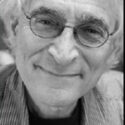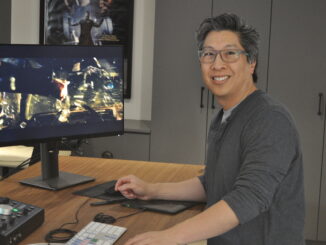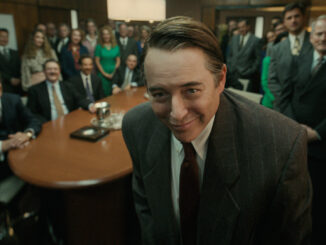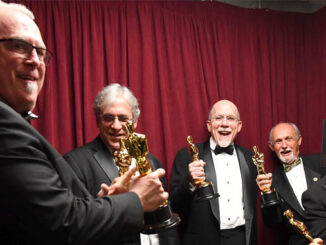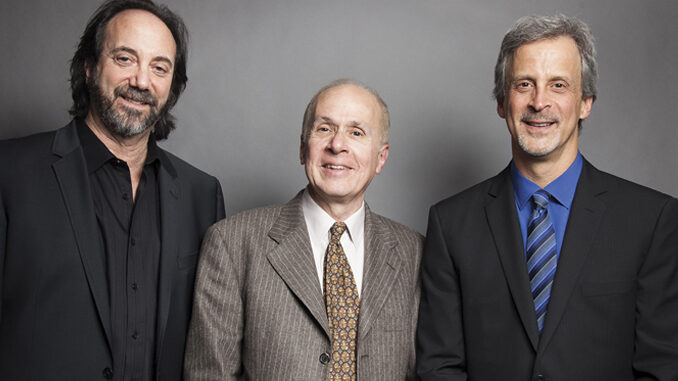
by Edward Landler
On Saturday evening, January 12, the Los Angeles Film Critics Association (LAFCA) presented its 38th Annual Awards at a gala dinner at the Intercontinental Hotel in Century City. Post-production personnel attending the celebration had a special reason to celebrate this event as LAFCA premiered its award for the year’s Best Editing. Sharing LAFCA’s first Best Editing award were Dylan Tichenor, A.C.E., and William Goldenberg, A.C.E., for their work on Kathryn Bigelow’s controversial Zero Dark Thirty.
Adding the editing award to their roster, LAFCA joins a growing list of film organizations and festivals beginning to recognize editorial achievement due to the ongoing campaign of the Committee for Creative Recognition. Jointly established by the American Cinema Editors (ACE) and the Motion Picture Editors Guild and chaired by Stephen Rivkin, A.C.E., the Committee has taken the initiative to influence film festivals and film organizations to add editing honors to their annual awards rosters.
Last June, the Committee intensified its campaign by launching an ongoing online Petition for Editors Recognition welcoming signatures from post-production and industry professionals, as well as other informed individuals. The petition clearly states its purpose: “Given the essential role film editors play in the creative process of making a film, acknowledging them is long overdue.”
“It was time to take our efforts to the next level to show that we have the support of more members of the film community,” Rivkin says. “It adds more weight.” To date, the petition has tallied up over 2,200 signatures from directors, producers, writers, production designers and cinematographers, as well as editors from more than 25 countries around the world.
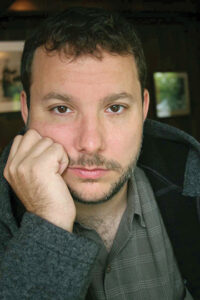
The Motion Picture Sound Editors (MPSE) and the Art Directors Guild have also officially endorsed the Committee’s efforts, while the campaign actively continues to seek support from other professional organizations.
The primary targets of the campaign for recognition are those institutions that already bestow awards for either cinematography or production design or both. Since they recognize these crafts, “They should see that editors work as closely with directors as cinematographers and production designers,” argues Rivkin.
The LA Film Critics Association is the fifth institution to initiate an award for best editing since the Committee went into action two years ago. Last year, the International Animated Film Society (ASIFA-Hollywood) included editing in their Annie Awards for the first time. On February 2 of this year, at the 40th Annies held at UCLA’s Royce Hall, the new tradition continued. For its second year of recognizing editing in animation, the Annie for features went to Nicholas C. Smith, A.C.E.; Robert Grahamjones, A.C.E.; and David Suther for their work on Disney/Pixar’s Brave. For best editing in animated TV, the award went to Hugo Morales, Adam Arnold, Davrick Waltjen and Otto Ferrene for the “Monkey in the Middle” episode of Nickelodeon’s Kung Fu Panda.
The other organizations to establish editing honors since the campaign began are the Academy of Science Fiction, Fantasy and Horror with its Saturn Awards, the Boston Film Festival and the Chicago Film Critics Association.
In December, as their Los Angeles counterparts would do a month later, the Chicago Film Critics Association gave its first editing award to Tichenor and Goldenberg for Zero Dark Thirty. In January, Goldenberg accepted the LAFCA award for himself and Tichenor, who was in New York working on a project.
At the podium, Goldenberg said, “I want to thank Steve Rivkin and ACE for championing this award for us. It’s a great honor for the first film to be given this award, as well as being the runner-up for Argo.” Second in voting for the LAFCA award, Argo was edited solo by Goldenberg.
After the ceremony, LAFCA President Stephen Farber of The Hollywood Reporter and Reel Talk told CineMontage, “We want to emphasize that editing is a crucial element in the making of a film. It is part of the whole film grammar and the essence of the medium. If, as critics, we are knowledgeable enough to recognize the contributions of cinematographers and designers, we can also appreciate the quality of editors’ contributions. Film is a collaborative art, but no matter who determined a specific cut, the editing and the role of the editor should be recognized.”
“Film is a collaborative art, but no matter who determined a specific cut, the editing and the role of the editor should be recognized.” – Stephen Farber
Farber said that LAFCA had only once before given an award to an editor — in 1999, when their Career Achievement Award went to Dede Allen, A.C.E. He also noted that adding Best Editing to their roster of awards had been brought up by the association’s membership in the past.
Introducing fellow board member Justin Chang to present the new award at the event, Farber said, “After encouragement from ACE and MPEG, I presented the idea again and there was now support on our board.” Rivkin later noted that in approaching LAFCA, his committee had given Farber a portfolio of materials substantiating editing’s essential place in the filmmaking process, along with the signed Petitions for Editors Recognition.
According to Farber, Variety senior film critic Chang was chosen to give the award because he had recently written a book about editing and had interviewed Tichenor for the book.
Presenting the Best Editing honor, Chang said, “One of the most important cinematic disciplines has long been one of the least celebrated or understood. Tonight marks the first time in its nearly 40-year history that the Los Angeles Film Critics Association has recognized the craft of film editing. All the more fortunate, then, that we honor such a master class of the form in Zero Dark Thirty, a post-9/11 docudrama whose every scene is crisp, tense, essential and surprising.”
Going into greater detail, he said, “Editors Dylan Tichenor and William Goldenberg would have merited this prize for their climactic sequence alone…that brilliantly juxtaposes low-lit, handheld camerawork and eerie, night-vision footage. Yet to focus exclusively on [this] tour de force would be to understate the achievement of this densely packed, urgently paced 157-minute film. In this decade- spanning drama, a single cut can span five minutes or five months, and the passage of time itself becomes a key secondary theme.”
Chang even pointed out a kinship between editors and “Jessica Chastain’s performance as the unsung hero of the enterprise, toiling quietly behind the scenes in pursuit of a job well done. One suspects that Goldenberg, Tichenor and film editors everywhere understand her all too well.”
Later, Goldenberg told CineMontage that the intimately scaled LAFCA event gave him “a refreshing new view” of critics. “Working on movies, we live in fear of critics,” Goldenberg explained. “But during the dinner, I recognized their impassioned love for film. Everyone who was there really loves movies like I love movies. And the best part of the award is that it lets me keep doing my job.”
Goldenberg also praised Kathryn Bigelow as “a dream director — brilliant, incisive, intuitive.” Of his relationship with Tichenor on the film, he said: “We saw the movie in a similar way in organizing scenes and where we thought the film should go, letting the story and the stars shine.”

In a telephone conversation from New York, Tichenor said he was “super-honored and grateful, and happy people are recognizing our work. Billy wrapped up Argo and came on after shooting finished. I had almost all the assembly done except for the editing but, with two million feet of film in Kathryn’s cinema verité style, we had lots of choices and lots of work. We ended up ‘ping-ponging’ parts of the film back and forth.”
Echoing Goldenberg, he said, “We saw the movie—and the ideas for cutting it—very similarly.” Then, half-jokingly, he added appreciation for the Committee for Creative Recognition: “We drove them to give us an award.”
Taking time to enjoy his committee’s recent successes, Rivkin also attended the LAFCA event and noted that there were many more organizations that should be acknowledging the editor’s role in filmmaking: “We will make every effort it takes to elevate the perception of editors everywhere. I know this is a long battle, but I don’t care how long it takes, as long as there are positive results like this.”
With their high profile in the industry, the Sundance Film Festival and Film Independent with its Independent Spirit Awards are two key institutions being lobbied to start giving editing honors. Among the other organizations asked to consider editing awards are the Tribeca Film Festival, the Shanghai International Film Festival, the San Sebastian (Spain) Film Festival, the Byron Bay (Australia) International Film Festival, the New York Film Critics Circle, the New York Film Critics Online, the National Society of Film Critics and the Washington, DC Area Film Critics Association.
The initial approach to award-giving organizations involves letters and personal e-mails, according to Rivkin. In the first letter, the editor’s crucial role in filmmaking is stated objectively: “The editor creates the first cut as the film is being shot, which requires skills in storytelling, performance, shot selection, structure, rhythm, pace, length, taste and talent. This first viewing of the film is often the most important as a first impression is formed, and it helps the filmmakers to define the task ahead. The director and the editor are collaborators in the process of refining and trimming, working closely together through completion and delivery of the final film.”
From the earliest days of the Hollywood industry, acknowledgement of the essential role of the editor in the filmmaking process has consistently been wanting. Accounting for this mystery, Rivkin wrote in ACE’s CinemaEditor magazine, “Perhaps the years we’ve spent in the background, telling stories seamlessly, contributed to the invisible nature of our jobs. Not to mention the fact that many people still don’t understand exactly what it is that we do. Unfortunately, this lack of understanding often leads to a lack of recognition of our work.”
For more information about the Committee for Creative Recognition and the Petition for Editors Recognition, visit www.editorspetition.com, where you can read and sign the petition.


